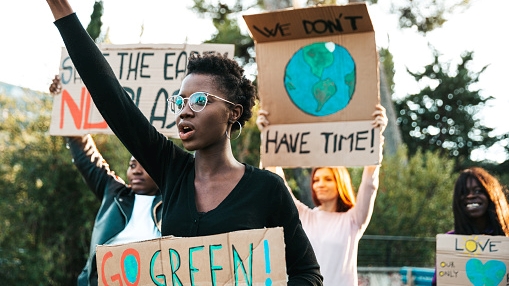John Della Volpe, the director of polling at the Harvard Institute of Politics, is on a mission to dispel myths about Gen Zers in his new book, Fight: How Gen Z Is Channeling Their Fear and Passion to Save America.
The publication's title says it all, as the book is centered on young Americans being determined to fight for change within the U.S.—contrary to older generations' misconceptions about Gen Z.
"I don't think there is any generation in 75 years that has been confronted with more chaos, more quickly in their young lives than Gen Z or Zoomers," Della Volpe said in a recent promotional interview. "Many of them were born right around 9/11, and it's always been kind of a shadow in their lives. Millions of their parents lost their homes due to the Great Recession."
"Entering school, they faced lockdown drills, things that my generation had never seen. And the idea of going to a place and being safe never really existed for young people," he continued. "Just so much chaos, even before COVID-19 and the social isolation of the lockdown, all of this accelerated by social media. All of this happening before they were 25. So that's where they came of age."
However, instead of being broken by this "chaos," Della Volpe says that Gen Zers were made more robust and more determined.
"Rather than melting, it made them harder and made them tougher and made them more focused to do great things for themselves and for the country," he added.
Veteran pollster John Della Volpe says that everything he was told — and that most people think — about Generation Z is wrong.
He explores the evolution of Gen Z and politics in his new book: https://t.co/dmw7upmIlR
— NPR Politics (@nprpolitics) January 18, 2022
The book features a foreword by David Hogg, an activist who's one of the Marjory Stoneman Douglas High School shooting survivors. While discussing the publication, Hogg spoke on how gun violence and climate change add to Generation Z's ever-full plate.
"I think that the anxiety that comes from gun violence, from climate change to all these other things is something that a lot of generations right now just can't understand, the scale of the existential threat that young people today feel," he noted.
"What I will say, though, is that as we've seen in times before when generations faced challenges, they come to meet them. Oftentimes, you know, movements find their leaders. I think we saw that in 2020," Hogg optimistically added.
Later, Della Volpe spoke on how Donald Trump's presidency impacted Gen Z's political compasses.
"Every generation determines their political values in their teenage years, in their early 20s, and so much of that is shaped by the president that is serving during that period of their lives. While [Gen Z-ers] were looking for an opportunity to unite us, they saw a president and administration more bent on dividing young people," he stated.
Gen Z will reject the Republican Party until the Republican Party rejects Trumpism.
Thank you to @dellavolpe for highlighting the political power (and story) of Gen Z. Can’t wait to read the book.
— Santiago Mayer (@santiagomayer_) January 18, 2022
"Our generation stepped up and decided to unite ourselves," Hogg added. "What I fear at this point, though, is the mental health crisis that Gen Z is facing right now and the burnout and exhaustion that I know so many of us feel, myself included."
"It's just a significant, significant crisis," Della Volpe agreed. "When folks are so depressed and so isolated and they withdraw, one of the concerns I have for them is to withdraw, spend more time online where they could potentially be more easily recruited into places where they don't necessarily even agree with the ideology, [such as hate groups and alt-right communities]. We have so many young people, especially young men, who are vulnerable right now."
Towards the end of his recent interview, Della Volpe shared his thoughts on how Generation Z's political power will begin to truly manifest in upcoming years.
"We think so much about this country being divided, and clearly it is. But it's really divided by age," he said. "We look at Gen Z and Millennials—two-thirds of them support candidates who are Democrats, not Republicans. And once you get to Baby Boomers and the Silent Generation, it's a different scenario."
"As younger people age, as younger people begin to make voting a more regular habit, there is no question that they will be voting for the values that they've been developing over the last couple of years: concern about the way in which capitalism is practiced, concern about our climate, concern about racial justice," Della Volpe continued.
"They've made a greater impact on these issues than many people may already appreciate, and that those Democrats, as well as Republicans who don't take them seriously today, will underestimate them at their peril," he concluded.
